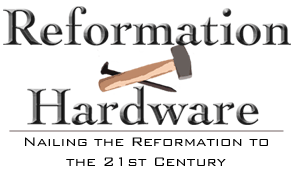I’m hoping that this might become an occasional series on my thoughts about a biblical hermeneutic that is essentially Reformed in perspective and essentially baptistic. I know that sounds like I’m saying that I want to develop a method of reading the Bible that will result in believer’s-only baptism, but that isn’t what I’m intending. There are plenty of Baptists who are Reformed 1By “Reformed” I mean more than just Calvinists. I’m thinking at least Calvinist but also adhering to a form of Covenant Theology in opposition to Dispensational or New Covenant Theology. and generally we read the Bible in similar ways. These Christians would most likely agree with the theology expressed in the 1689 London Baptist Confession of Faith. I’ll be using that confession as a guideline as I consider this subject.
So why develop a hermeneutic at all? Well, you have one even if you don’t know it and even if it isn’t consistently applied. A hermeneutic shouldn’t be a pair of shackles that bind you as you read the Scriptures, but neither should it be a pamphlet that introduces you to the city zoo but doesn’t really give you much detail. I think it should be somewhere in between those two and it should be an aid in making sense of the Biblical record.
“Why not just read the Bible and leave it at that?” Well, as I said, you have a hermeneutic whether you acknowledge it or not. When we read our Bibles we come to them with a set of presuppositions that affect how we understand the text. We need to be honest about that. If we think otherwise, we’re fooling ourselves. The question is not whether we have presuppositions or not, it is whether they are Biblical presuppositions. If we can acknowledge our presuppositions exist then we can try to allow the Bible to correct them where they need correction. I think this is possible to a certain resolution and then there will be honest differences after that. What I mean is that there will be some things that we’re just going to disagree on even if we use the same hermeneutic.
Let me give you an example of how some of this works. For a while after I became a Protestant, I adopted the dispensational teaching I’d heard on Christian radio. My presupposition was that there was a distinction between Israel and the Church in this age. The promises made to Israel were for ethnic Israel and were not transmitted to the Church. So as I was teaching through the book of Galatians, I got to chapter 3. I was doing okay till I got to verse 29, “And if you are Christ’s, then you are Abraham’s offspring, heirs according to promise.” Now I wanted the Abrahamic Covenant to be just for the Jews, Abraham’s offspring. When I read this verse I remember pushing back from the kitchen table and thinking, “How do I explain this?” I wanted to find a way to look Galatians 3:29 in the face and maintain the distinction. It took a second before my conscience kicked in and I decided that if the Bible says that we are heirs to Abraham’s covenant, then that was the way it was. 2This is not “replacement theology” where the Church replaces Israel. That would mean that the Jews were cut off and that clearly isn’t true. This is more “fulfillment theology” where the community of Israel is expanded and the promises that include the ingrafting of the Gentiles are part of the picture. I don’t know anyone who holds to replacement theology. I had to let my presupposition go or be at odds with what the Bible teaches. Once I released it, I saw in other passages that the same thing was true. It wasn’t taught only here. I hadn’t seen it in other places before because my presupposition caused me to read those verses a certain way.
An example of how a similar hermeneutic will only get us so much “resolution of agreement” is in the area of eschatology. Reformed Baptists are largely amillennial in their eschatology. Largely but not exclusively. I am premillennial of the historic kind. I’m not aware of any who are postmillennial but there are probably a few. Some of the issues that we face require more resolution than a hermeneutic that is generally agreed on can yield. This is really important to keep in mind because our eschatology can drive some of our presuppositions.
So back to the hermeneutic issue. I recognize that we’re going to have presuppositions and I want to include that reality in the development of the hermeneutic. To ignore them will insure failure. But I also want to make room for those presuppositions to be challenged and corrected by the testimony of the Bible.
Well, that’s the introduction to the topic. We’ll have to see if I go any farther with this, but I probably will. This is something that I’ve been thinking on for a while and it finally found its way to my finger tips.
| ↩1 | By “Reformed” I mean more than just Calvinists. I’m thinking at least Calvinist but also adhering to a form of Covenant Theology in opposition to Dispensational or New Covenant Theology. |
|---|---|
| ↩2 | This is not “replacement theology” where the Church replaces Israel. That would mean that the Jews were cut off and that clearly isn’t true. This is more “fulfillment theology” where the community of Israel is expanded and the promises that include the ingrafting of the Gentiles are part of the picture. I don’t know anyone who holds to replacement theology. |

 There is a $27 million museum being build outside Cincinnati that promotes a creationist view of, well, creation. In this age of tolerance and peaceful coexistence, you’d figure the whole thing would be ignored except by those who already hold a literalist view of the first chapters of Genesis, right? Bah! One of the most intolerant groups of people in the world is scientists! Don’t you dare shake the status quo! And so
There is a $27 million museum being build outside Cincinnati that promotes a creationist view of, well, creation. In this age of tolerance and peaceful coexistence, you’d figure the whole thing would be ignored except by those who already hold a literalist view of the first chapters of Genesis, right? Bah! One of the most intolerant groups of people in the world is scientists! Don’t you dare shake the status quo! And so 
 Ah,
Ah,  Well, well. It looks like
Well, well. It looks like